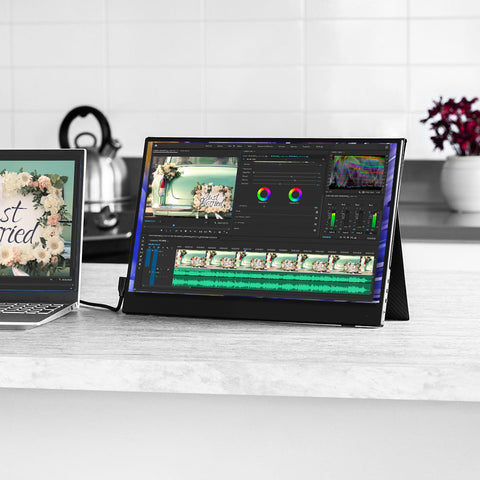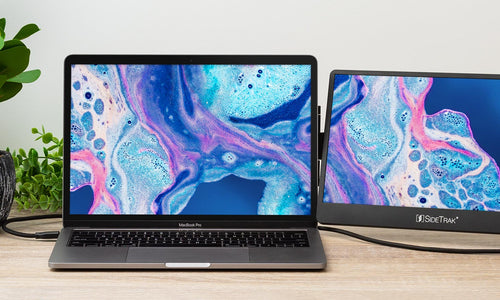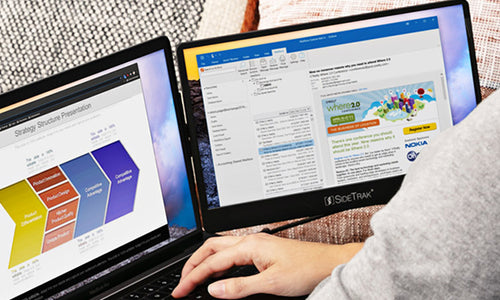10 Items for Optimal Ergonomics and Productivity
The list of aches and pains caused by long hours working on a computer is extensive—eyestrain, neck and shoulder pain, backaches and headaches, and repetitive stress injuries in your arms and hands—and probably somewhat familiar.
There’s an obvious physicality to these types of work-induced pains, but they also take a toll on your productivity. Work will always be work (that’s why you get paid!), but neither you nor your sense of accomplishment need to suffer for it.
A precursor on posture
Many workers bend themselves to their technology, quite literally. A more comfortable option for your productivity and both short- and long-term comfort is to redesign your workspace with posture as the priority.
Over time, poor posture creates excess pressure on your neck and shoulders. It can lead to a repetitive stress injury or even nerve issues resulting in numbness and tingling in your arms and hands. These pains add another layer of stress to busy, deadline-driven workdays. Your breathing and mood take a hit. Your productivity suffers.
Find solutions by first locating the problems. Ask someone to take a picture of you working at your desk. Evaluate if you are looking straight ahead, if your neck, arms, and wrists are straight, if your shoulders are relaxed, and if your spine is in a naturally curved (but not slouched) position.
Once you find your problem areas, you can employ a combination of ergonomic devices as well as personal adaptations. You’ll feel better and be maximally productive again.
1. Adjustable desk converter
Many use a monitor or laptop stand to elevate their computer screens to eye level, but with an adjustable desk converter, you can adjust only your screen or your entire desk.
An adjustable desk converter allows you to convert your traditional sitting desk to a standing desk and back again. Standing for periods of time can reduce back pain, burn calories, and increase your energy. Keeping your screen at eye level reduces the pressure and strain on your neck.

2. Portable Monitor
Do you work on a company-issued laptop? Then you’d probably benefit from a larger second screen. With a second screen, there’s no need to switch back and forth between tabs or split your small laptop screen in two. Instead, keeping both documents full size cuts down on the need to squint or slouch in. A second screen allows you to move efficiently between the displayed tabs, which increases your productivity.
Even with two screens, follow the 20-20-20 rule. Give your eyes a 20-second break every 20 minutes by focusing on something at least 20 feet away.

3. Space heater and personal fan
Temperature complaints aren’t just for office buildings. Regulating the temperature of your home office is a challenge, too. Whether you work from home or make the trip into a shared office, a simple space heater and fan are easy ways to give your personal space the temperature adjustment you need.
4. Ergonomic mouse and keyboard
Your mouse and keyboard should be positioned so your arms and wrists are in a neutral and relaxed position, neither flexed up nor down. Your wrists should hover, rather than rest, on these accessories or on your desk.
For extra credit, learn to occasionally navigate your mouse with your opposite arm to avoid overuse on one side. Or opt for a touchscreen monitor that allows your arms and hands to move comfortably through a range of positions rather than remaining painfully static.

5. Noise-canceling headphones
Headphones can’t be beat for blocking out distracting sounds or as a delivery vehicle for inspiring yourself with a personally driving soundtrack. Maybe a podcast will help keep you motivated during design work or while slogging through straightforward tasks?
Ergonomically, talking via headphones is a vast improvement over holding a phone to your ear or balanced in the crook of your neck.

6. Posture corrector
Good posture comes from strong core muscles and an open chest position. Ideally you create this through personal strength and flexibility. Insufficient strength, injury, and poor habits can take time to heal or correct, and a posture corrector can help. If you’ve got a yoga strap laying around, there are DIY options, too.
7. Intentionally-chosen chair
In addition to ensuring you’ve chosen a chair that allows you to maintain your normal spinal curve, consider a massaging option. While you wait for that delivery to arrive, make sure your feet are flat on the ground and your shoulders are relaxed and open. If your chair has armrests, lower them to better ensure your shoulders stay relaxed.
While you’re at it, think about your jaw. Is it tight and relaxed, or is your mouth gently closed with your teeth slightly parted? Jaw tension is a top contributor of neck pain and headaches.

8. LED Lamp
Eye strain is another top contributor to computer-induced headaches. A desk lamp can allow you to adjust the brightness, color, and quality of the light in your workspace. An option with a USB charging station has the bonus of helping cut down on clutter.

9. Waterless wipes
Sometimes the best things in life are simple. Wipes for your computer and glasses offer quick cleanup for sticky situations. Run them over your keyboard and desk as well to refresh your space without the need for multiple products.
10. Apps
In addition to tried-and-true apps like Evernote, Asana, and Airtable, try Zapier and Notion to help automate and organize your work. What’s the point of getting all comfy if you just keep procrastinating on the same ol’ inefficiencies?
July 6, 2022



